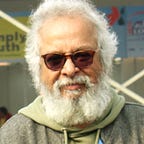Tryst With Bharat-1
The roads, rather passages, are so narrow that Fortuner or that size SUV would find navigating them arduous. With one 5-degree deviation on either side, the vehicle would derail in the sugarcane or paddy fields and get stuck until assistance arrives.
Green in front. Green on the left. Green on the right. Green in the rear. Omnipresent. Crows caw. Cattle moo. Goats bleat. All unseen. Occasionally, the sound of peacock/hen makes that horrible throaty noise. That’s the daytime ambiance.
At night, it is pitch dark. The moving vehicles’ headlights ensure the presence of passage ahead for fifty meters. Kaffi hai! You cannot drive faster than 7–8kmph.
Men cycle through those dark roads, unmindful of what if a tiger from the nearby Dudhwa Tiger Reserve were to stroll through these paddy fields and desire to taste the salty human blood for a change. Warm namkeen khoon!
The fields are thick black at night, with no moon hovering overhead. Frogs creak to puncture the nightly silence as orchestral support for the gir-gir of the moving motorized vehicle.
Driver Kamal downed the car windows, and Sonu Nigam was belting out Maa ki dil — a devotional song I had never heard, unmindful of the surrounding sound, particularly from the tryst between the Compass tires and the sand and pebbles on the uneven and muddy single-vehicle passage.
What if another vehicle approaches from the other direction? “Choda, Sir. Hum manage karlenge!” retorts the lean Uttarakhandi sarati at the wheels. No road rage, perhaps.
Where am I? Pallia is a bustling town on the Indo-Nepal border in the Indian state of Uttar Pradesh. Yes, the town is like any other in Bharat, where most Indians live and die. But I am deep inside where I can hear my heartbeat with precision. No Horn, Please! Zone?
The air is so pure for a metro person like me, accustomed to polluted watavaaran and unceasing noise, and I feel suffocated! Where are my fellow 1.4 billion Indian brothers and sisters, that economic and political pundits describe as a demographic dividend?
India lives in its villages, I have been taught. But I am in a zone where I feel I am in an isolation ward in a hospital.
For the company, I have driver Kamal and “Sancho Pancho” Mukesh, a local lad who migrated to Delhi NCR long ago. “I was born here, but my upbringing is in Delhi,” boasts the iPhone-wielding junior HR executive in his early twenties. He takes time off one night to visit his Chacha/chachi in Bambnagar, 10 kilometers from the farmhouse where I am put up. Rooted and connected.
Ramji, another Chacha of Mukesh, is my morning walk escort along the periphery of the 40-acre farm of my decade-long transport vertical friend and chairman of the Goverdhan Asha Foundation Vipul Nanda — my host for this trip — will out beat Jeeves, Bertram Wooster’s Man Friday (MF). A man associated with the Nanda parivar for at least two decades.
Being a city folk, I cannot identify the growing paddy. The lanky MF, in shorts and a collarless Tee shirt like me, removes such mental cobwebs. Then I tried to figure out the final stage of that produce which kept me alive for the past 67 years. Is ignorance bliss? Dunno.
(To continue)
